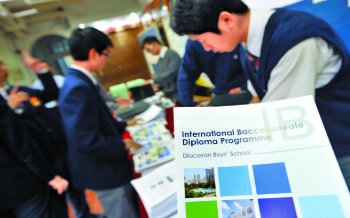News and Events
In this column, we will look into the difference in course framework between the International General Certificate of Secondary Education and the International Baccalaureate Middle Years Programme.
The IGCSE course is similar to the old O-Level system, with a concrete and fixed course framework or syllabus, listing the content students must learn.
Students who complete the learning content required by the framework are eligible to take the public examinations. The public exams also have a clear scope so students can practise with many past papers before the exams. As long as they learn according to the syllabus and reinforce their learning with personal knowledge, they are set.
The IBMYP is different. It does not have a fixed content framework that dictates what knowledge students must learn. Even the public exams consist only of higher-level general guidance. Instead, the IBMYP curriculum is based on inquiry-based and project-based learning, emphasising task orientation.
For example, in the early stages of the IBMYP, teachers will still impart some basic knowledge but as students move up to higher grades, learning is through research questions posed by the teachers.
A science teacher might ask: "How do cultural and conditional changes to diet influence a person's health?" This question covers a broad range of skills, and students need to think and find ways to verify whether what the question states is correct or not, collect data, conduct research, and analyze their findings, then relate it to some scientific theories they have learned to confirm or refute the question.
Another difference is that IBMYP teachers employ a more guiding approach to teaching than their IGCSE counterparts. They transmit knowledge only partially through lecturing. Students need to find different resources after introducing some understanding.
So an IBMYP teacher is more like a facilitator, with the students taking the lead in their learning.
This means the IBMYP curriculum allows students to learn more broadly and autonomously. Teachers give students many questions to research, providing numerous opportunities for self-discovery and independent thought.
As a result, parents often express concerns that the IBMYP lacks a framework, leaving them unsure about what their children are studying or learning.
Because of this, the IBMYP is more suitable for students with solid self-learning capabilities who can learn more than the IGCSE framework provides during the process.
Why is this the case? In the IBMYP, students need to seek knowledge in their own way, leading to deeper and broader self-learning. Other students can also gain insights from their peers' research presentations.
They can ask each other reflective questions - such as "Is your argument valid?" or "Are there any flaws?" - to engage in deeper critical thinking.
This approach is very beneficial for the students, encouraging more thought.
However, not all students can be so proactive.
Some may not have fully mastered skills such as questioning, analysis, or logic, or they may be more suited to learning through lectures, which may mean that the IBMYP teaching style is unsuitable.
If a student's analytical ability is less intense, he or she may get overwhelmed by the amount of information. Some students may need more vital logical abilities to help integrate different points or steps into a coherent whole. These students might find the IBMYP overwhelming, with too much information to process, and need help.
So a student's abilities and personality are the primary factors in choosing IGCSE or IBMYP.
In summary, the IGCSE is more solid in constructing an academic foundation, and the mindset for exams is more robust due to the practice through written tests.
However, this is not to say that the IBMYP is inferior. It has its advantages: IBMYP students might have less exam training, plus their assessments are conducted online and are relatively more straightforward than the IGCSE written tests.
If these students later move on to A-Level or the IB Diploma Programme, they won't have as strong an exam-oriented mindset.
They will have plenty of opportunities to conduct research and give oral presentations. Through long-term practice of presentations and research, they receive more training in this area.
While IBMYP students may need more vital exam skills, is a heavy focus on exam skills necessary for the current generation? Do we need exam skills or the skills for oral presentations?
These questions are debatable and also for parents to consider.
Due to continuous training, the average IBMYP student has relatively higher capabilities in expression and conducting research. Additionally, the IBMYP curriculum teaches students self-learning and independent thinking - skills more aligned with future societal development needs.
Society in the future will require more than just knowledge acquisition.
The question is whether students can benefit from this learning method.
Otherwise, if they are not well-equipped with these abilities and are forced to learn this way, it could backfire, leading to them facing public exams without a solid foundation.
Finally, the IBMYP requires students to engage in interdisciplinary learning, not just learning geography in geography class or history in history class.
For example, when examining the impacts of revitalizing an old district, students must explore different dimensions such as experiences, livelihoods, historical culture and sociology - hence the interdisciplinary significance.





